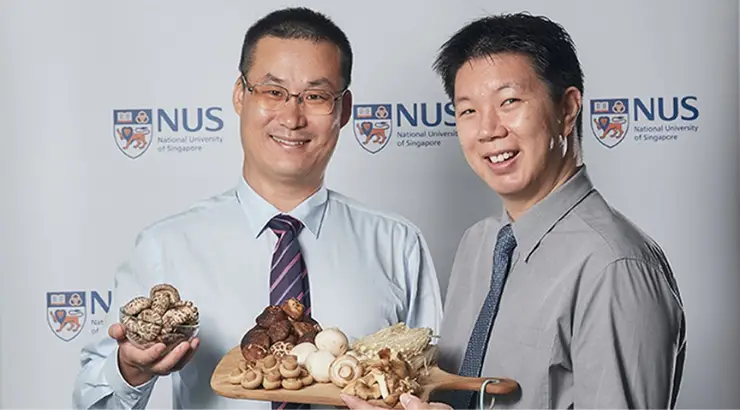Eating Mushrooms Can Prevent Cognitive Decline in Seniors, Study Suggests
Eating mushrooms can significantly reduce your chances of losing brain functions later in life.

Truth Theory

(TT) — A new study from the National University of Singapore (NUS) has suggested that having a diet that consists of a lot of mushrooms could significantly reduce your chances of losing brain functions later in life.
Researchers estimate that people who eat more than two standard portions of 300g, or half a plate of mushrooms every week, could be 50% less likely to have a significant decline in brain function as they age. The researchers believe that an antioxidant and anti-inflammatory known as ergothioneine is responsible for these remarkable results.
Dr. Irwin Cheah, a senior research fellow from NUS Biochemistry explained that humans are not able to synthesize this vital compound on our own.
“ET (ergothioneine) is a unique antioxidant and anti-inflammatory, which humans are unable to synthesize on their own. But it can be obtained from dietary sources, one of the main ones being mushrooms,” Cheah said.
In six year study, which took place between 2011 and 2017, researchers collected data from 600 Chinese seniors over the age of 60 living in Singapore.
The test subjects were interviewed extensively, and their medical history was shared with researchers as well. The dietary habits of the subjects were also detailed thoroughly, and they were given a neuropsychological assessment and a dementia rating. The researchers mentioned six types of mushrooms in the study that are associated with higher brain function, including oyster, shiitake, and white button mushrooms.
Lead researcher Feng Lei, who is from NUS Psychological Medicine, explained that tracking mild cognitive impairment (MCI), was the metric they used to determine the efficacy of the mushrooms.
People with MCI are still able to carry out their normal daily activities. So, what we had to determine in this study is whether these seniors had poorer performances on standard neuropsychologist tests than other people of the same age and education background. Neuropsychological tests are specifically designed tasks that can measure the various aspects of a person’s cognitive abilities. Some of the tests we used in this study were adopted from a commonly used IQ test known as the Wechsler Adult Intelligence Scale,” Feng explained.
Cheah also said that doctors may be able to determine risk factors for conditions like Alzheimer’s by finding out if the patient has a deficiency in ergothioneine. Other compounds found in these mushrooms, including hericenones, erinacines, scabronines, and dictyophorines can also stimulate nerve growth, the researchers reported.
The team plans to continue their research in this field by performing a randomized controlled trial with the pure compound of ET and other plant-based ingredients, such as L-theanine and catechins from tea leaves.
By John Vibes | TruthTheory.com | Republished with permission
Thanks to: https://themindunleashed.com
Eating mushrooms can significantly reduce your chances of losing brain functions later in life.
Truth Theory

(TT) — A new study from the National University of Singapore (NUS) has suggested that having a diet that consists of a lot of mushrooms could significantly reduce your chances of losing brain functions later in life.
Researchers estimate that people who eat more than two standard portions of 300g, or half a plate of mushrooms every week, could be 50% less likely to have a significant decline in brain function as they age. The researchers believe that an antioxidant and anti-inflammatory known as ergothioneine is responsible for these remarkable results.
Dr. Irwin Cheah, a senior research fellow from NUS Biochemistry explained that humans are not able to synthesize this vital compound on our own.
“ET (ergothioneine) is a unique antioxidant and anti-inflammatory, which humans are unable to synthesize on their own. But it can be obtained from dietary sources, one of the main ones being mushrooms,” Cheah said.
In six year study, which took place between 2011 and 2017, researchers collected data from 600 Chinese seniors over the age of 60 living in Singapore.
The test subjects were interviewed extensively, and their medical history was shared with researchers as well. The dietary habits of the subjects were also detailed thoroughly, and they were given a neuropsychological assessment and a dementia rating. The researchers mentioned six types of mushrooms in the study that are associated with higher brain function, including oyster, shiitake, and white button mushrooms.
Lead researcher Feng Lei, who is from NUS Psychological Medicine, explained that tracking mild cognitive impairment (MCI), was the metric they used to determine the efficacy of the mushrooms.
People with MCI are still able to carry out their normal daily activities. So, what we had to determine in this study is whether these seniors had poorer performances on standard neuropsychologist tests than other people of the same age and education background. Neuropsychological tests are specifically designed tasks that can measure the various aspects of a person’s cognitive abilities. Some of the tests we used in this study were adopted from a commonly used IQ test known as the Wechsler Adult Intelligence Scale,” Feng explained.
Cheah also said that doctors may be able to determine risk factors for conditions like Alzheimer’s by finding out if the patient has a deficiency in ergothioneine. Other compounds found in these mushrooms, including hericenones, erinacines, scabronines, and dictyophorines can also stimulate nerve growth, the researchers reported.
The team plans to continue their research in this field by performing a randomized controlled trial with the pure compound of ET and other plant-based ingredients, such as L-theanine and catechins from tea leaves.
By John Vibes | TruthTheory.com | Republished with permission
Thanks to: https://themindunleashed.com






 Sat Mar 23, 2024 11:33 pm by globalturbo
Sat Mar 23, 2024 11:33 pm by globalturbo

